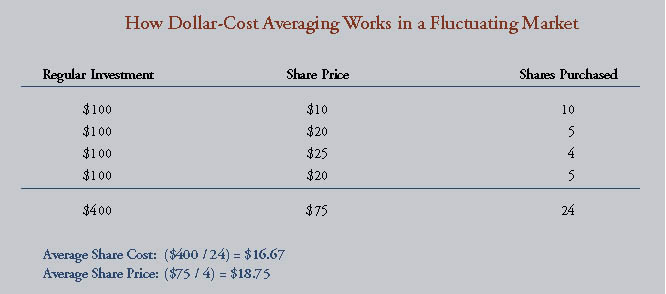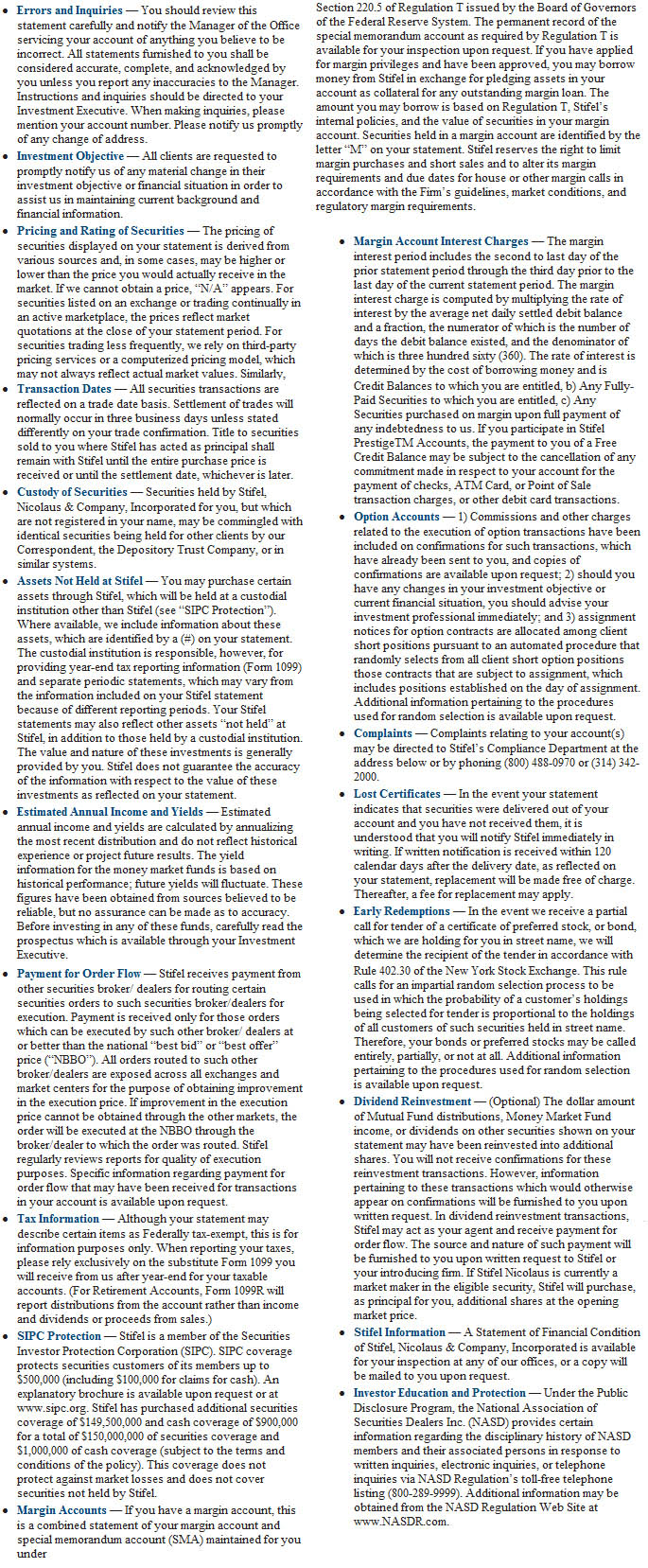|
ROLLOVER
CENTER |
| |
|
| |
STIFEL
NICOLAUS |
| |
|
|
Investment
StrategistTM
Say Goodbye to Stock Certificates
April 2009
|
Physical stock
certificates once were commonplace in the financial services
industry. However, new technology platforms and regulatory
changes have gradually moved investment firms and securities
issuers away from physical certificates and toward securities
issued and held in book entry form as part of an ongoing
dematerialization program. This is accomplished by holding
client account assets in �street name� or client name through
the Direct Registration System (DRS).s any concerns you may have with your
Financial Advisor, who can help you stay focused on your long-term
plans. |
 |
Since the 1970s, the financial
services industry has used increasingly sophisticated book-entry
computer systems to handle millions of securities transactions
every day � swiftly, effortlessly, and safely. When you use the
book entry system, there is no longer any need for you to make
trips to a safe deposit box, or to run the risk or expense of
having paper certificates get lost, misplaced, stolen, or damaged
at home or in the mail. The majority of Stifel�s clients already
use book entry instead of paper certificates.
Another form of book entry is called
the Direct Registration System. DRS direct book entry was created
to provide shareholders the ability to move shares between
brokerage accounts and an issuer�s transfer agent without the
distribution of physical certificates. All member firms of the
Securities Industry and Financial Markets Association (SIFMA) have
been requested to discontinue providing physical certificates for
exchange-listed issues that are DRS-eligible. If the issuer whose
shares you hold or want to buy participates in DRS, you can use
this system to register your shares in your own name directly on
the books of the issuing company or a company designated by the
issuer to handle these transactions, called a transfer agent. You
will receive regular statements from the company (or the transfer
agent) showing your holdings.
Beginning January 1, 2009, the
Depository Trust & Clearing Corporation (DTCC) eliminated the
option to obtain a physical certificate for all DRS-eligible
issues.
Should you wish to obtain a physical
certificate for a security that is DRS-eligible, you will need to
contact your Financial Advisor and request that these shares be
sent to the transfer agent as DRS shares. The shares will then
leave your Stifel account and be moved electronically to an
account at the transfer agent in your name. There is no charge to
your Stifel account for this request. Once the shares have been
deposited to the transfer agent, that agent will mail you a
statement showing the shares held by the agent in an account in
your name. You can then contact the agent to obtain a physical
stock certificate directly from the transfer agent if this issuer
still offers physical stock certificates.

|
V i s i o n
�
P l a n n
i n g
�
F o c u s |
|
SNINS030901
|
Staying in the Market
|
|
|
|
In 2008, the S&P 500 fell by 37%, the
second-worst year in the history of that index. The markets have been
battered in 2009 as well, and even well-constructed, well-diversified
portfolios have taken a severe beating. But just because the value of
your investments may have taken a hit in recent months doesn�t mean
you should simply give up.
Maintain a Long-Term Focus
Over the course of investing for
long-term goals such as retirement, the market will certainly have its
share of ups and downs, but historically speaking, it has inevitably
recovered from its down periods (of course, past performance is no
indication of future results). Amid all of the negative headlines and
downbeat economic forecasts, it�s easy to panic � don�t. Stay calm,
maintain your long-term perspective, and don�t let emotions drive your
investment decisions. The overall impact of market volatility on your
investments will depend on your investment time horizon. For example,
if you have just a short time period before retirement, your portfolio
will have less time to recoup any losses sustained during a down
market. On the other hand, if you have a significant amount of time
before you need to access your investment funds, your portfolio is
much more likely to have fully recovered before that time.
 |
Don�t Try to Time the Market
There�s an old saying that
successful investing may be derived from time in the market,
not market timing. Many experts will also agree that
determining the �best� time to get in or out of the market can
be nearly impossible, and that for most investors, trying to
time the market is not a practical investing strategy. Trying
to determine exactly when one should aggressively invest or
back out of the market takes a considerable amount of
expertise and time to monitor market environments. And even
the most savvy investors and advisors can�t guarantee that
their predictions will be correct, since there are no
guarantees when it comes to how the financial markets will
perform.
|
There is an advantage to staying in
the market for the long term, versus trying to determine specific
times to get in or out of the market. This advantage can best be
explained with the concept of dollar-cost averaging. Dollar-cost
averaging is simply investing equal or fixed amounts of money at
regularly scheduled intervals. With this investment strategy, you will
buy more shares when the price of your investment has declined, and
fewer shares when the price has risen. Over a period of time, you may
lower your average cost. Trying to predict when and how markets will
move can be nearly impossible and completely overwhelming. Whether you
are new to investing or a seasoned professional, dollar-cost averaging
can help you cope with price fluctuations in a volatile market.
By dollar-cost averaging, you may
reduce investment risk by not investing substantial amounts at the
wrong time. In addition, dollar-cost averaging forces you to invest on
a regular basis, as you would in a 401(k) plan, for instance. By
investing on a regular basis, you can avoid making bad decisions based
on emotions, such as the natural inclination to stop investing in a
weak market.
It is important to consider that
dollar-cost averaging does not assure a profit or protect against a
loss in declining markets. Before embracing the dollar-cost averaging
strategy, you should consider your ability to continue investing
during periods of falling prices.

-
Staying in the Market

Take Advantage of Buying Opportunities
A down market
doesn�t necessarily have to be a bad thing. You may be familiar with
the old saying �buy low, sell high.� During a market such as the one
we�re currently experiencing, many savvy investors are taking
advantage of attractive prices on stocks that were once considered
overvalued. Despite current economic conditions, there are still
strong, successful companies out there with the potential for future
gains.
Investors using dollar-cost averaging
will already be poised to take advantage of low prices. And, for those
who are not currently in the market, getting in at the bottom (or
close to it) may be the best time for new investors to enter. For
those investors who decide to halt their investing plans, or liquidate
their positions, they risk the opportunity to recoup their losses if
the market begins to recover. In addition, by getting out of the
market, an investor may miss some of the market�s best single-day
performances, as some financial experts believe that the most
profitable time of a bull market may be at the beginning.
|
Review Your Portfolio
Living through volatile market conditions can
be overwhelming. But you don�t have to go it alone. Your
Financial Advisor can help you understand what is happening
both with your portfolio and in the market. At Stifel, our investment philosophy is based on a century-old
tradition of providing solid, studied advice. With over a
hundred years of experience, we�ve been through all sorts of
market conditions and have the knowledge, perspective, and
experience to help you keep your investments on track during
difficult times. Taking a broader perspective on the market
can potentially pay off in the long run, so consult your
Stifel Financial Advisor with any concerns you may have
regarding today�s market conditions.
|
 |
- Account
Disclosures


Stifel, Nicolaus & Company, Incorporated
� Member SIPC
and New York Stock Exchange
� One Financial
Plaza, 501 North Broadway, St. Louis, Missouri 63102
�
www.stifel.com
|
|
|
